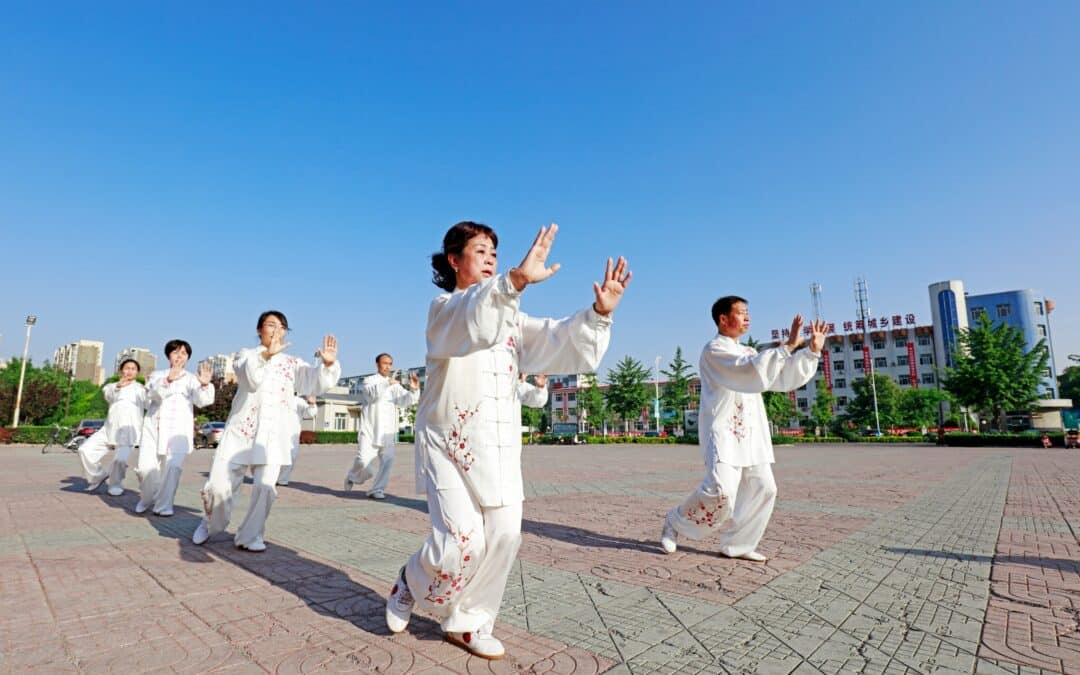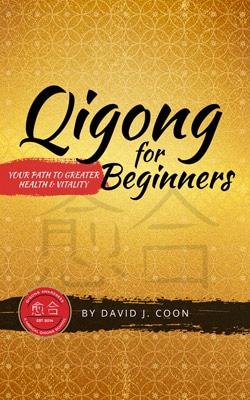At its core, Qigong is a moving meditation that focuses on energy. In Chinese, “qi” means energy, and “gong” means cultivation—together, they mean “energy work” and refer to the practice of harnessing energy. But what exactly is energy? Does Qigong give you more energy? How do we absorb or release energy when we practice? Why is circulating Qi powerful? In today’s post, we answer these questions and more.
What is Qigong energy?
Qigong energy refers to “qi,” a life force that exists in and all around us. When we practice Qigong meditation or exercise, this energy gets redirected into positive patterns for healing.
Our bodies contain energy at all times. But the way this energy flows can vary, having different effects on our mood and health. Energy can become concentrated in specific parts of our bodies, causing pain or swelling. Or it can circulate steadily, allowing us to feel grounded. Energy can also become quick or agitated, which is often linked to stress or anxiety. Energy has many vibrations and flows, and we will feel differently depending on those frequencies.
Qi exists in humans, but also in plants, animals, the ocean, and the mountains—we could even say there is an energy between people, within your family, or at your workplace. We can feel when vibes shift between us and another person, for example, or when things feel out of balance at the office. These are manifestations of energy flows. Energy flows are in flux all the time. Qigong helps channel our own energy so that we find equilibrium in our lives.
What is Qigong energy healing?
Like other forms of Traditional Chinese Medicine, such as Acupuncture, Qigong encourages the smooth flow of Qi through specific pressure points and meridians in the body. We store energy in different locations in our bodies, such as chakras and dantians. In Eastern Medicine, the body is divided into the Upper, Middle, and Lower Dantians, which are reservoirs of energy located in the upper, middle, and lower thirds of our bodies. That energy travels through various channels, called meridians, in the body. Qigong exercise facilitates energy flow from our reservoirs through those meridians so that energy does not become congested, allowing the body to heal itself.
While Qigong exercise supports the smooth flow and cultivation of energy through movement, meditation, and breathing, Medical Qigong focuses on the healing of the body with the aid of a practiced Medical Qigong Practitioner who can help determine where your Qi may be blocked or agitated and utilizes Medical Qigong Treatment Techniques for healing. A Qigong Master and Medical Qigong Practitioner has extensive knowledge of the body’s energy centers and meridians, and they will target specific areas for your needs so that your energy fields become balanced. Like Acupuncture, Medical Qigong supports the healing of a variety of health conditions, including joint and muscle pain, short and long-term illness, anxiety, and depression. You can read about David’s experience with Qigong healing in this post.
Can Qigong give you more energy?
Qigong gives you more energy because it is a practice of movement. We often say “use it or lose it” in the context of physical fitness, and this is true of Qigong energy. If you find yourself sitting on the couch all day, you might feel lethargic or less energetic. On the other hand, if you move mindfully with focused attention, you will gather and, therefore, have more energy.
In addition to improving physical fitness, Qigong is a holistic exercise that integrates breathwork and meditation. Meditation helps sharpen mental focus. Mindfulness, breathing, and exercise together keep our brain, blood, joints, tendons, organs, muscles, and respiratory system active and healthy. In these ways, too, Qigong helps us “use” energy instead of “lose” energy, encouraging energy flow from the inside out.
What happens to your body’s energy when you do Qigong?
Even though in everyday conversation, we talk about energy as something we gain (an “energy boost,” for example), technically, Qigong is a practice of cultivating energy. We always have energy of some kind, but it can stagnate or seem depleted at times. Qigong exercise transforms that energy into a positive force, leaving us more grounded, awake, or energized.
When we practice Qigong, energy circulates from our energy centers to other parts of our bodies. These flows build change over the long term—the more we practice, the more our energy is able to flow. Over time, you will start to experience powerful changes in your body. Qigong practice connects the mind, body, and spirit, leading to many positive repercussions in our everyday lives, including more energy and greater stability.
Do Qigong Masters absorb energy?
Since energy flows between people, animals, and things, energy can also be absorbed or transferred. Qigong Masters, who assist others in their healing process, can absorb what one could think of as unwanted or “toxic” Qi. This unwanted or “toxic” Qi is likened to how a mechanic gets grease on their hands when they’re working with cars. Qigong Masters can be left with unwanted or “negative” Qi from those exchanges. On top of absorbing emotions like anxiety or anger, they often find themselves absorbing many different kinds of energy at different frequencies at once. For this reason, energy healing demands a significant level of practice, awareness, and tools for clearing.
How do you release “negative” Qi energy?
“Toxic” Qi can also be released from our bodies, a vital process for rebalancing our energy fields. You can do several things to release “negative” Qi, such as taking salt baths that clear unwanted energy off of your body. Returning to your Qigong practice is also an important way to release unwanted Qi, as is being in nature. Practicing near the water, mountains, or big trees and plants helps release this “negative” Qi.
Why do I yawn when I do Qigong?
Yawning is usually associated with fatigue—we yawn when we get off the couch, are bored, or don’t get enough sleep. You might also experience yawning when you practice Qigong. This type of yawning is not caused by sleepiness but by our body’s response to energy shifts. More precisely, yawning opens the throat chakra and activates the parasympathetic nervous system (also called the “rest and digest” system), causing the body to relax. When we are in fight or flight mode, our bodies tend to ramp up, which is a stress response. Yawning in this context is a sign of healing because our nervous system is now relaxing and starting to calm down. This increases digestive function, blood flow, and Qi flow throughout the body.
David’s Video: Qigong & Energy Flow







